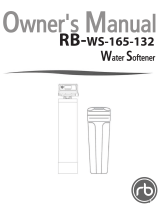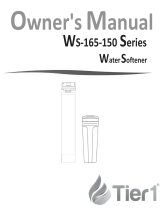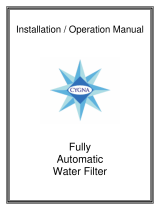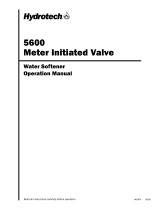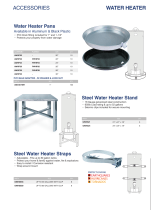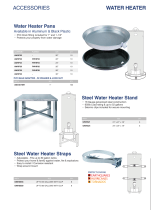
SIGNATURE 2 SERIES
Signature 2 Series
Nitrate / Sulfate
Manual
Installation / Operation Manual
Fully Automatic & Demand
Water Softeners

SIGNATURE 2 SERIES
Specifications................................................................................................................Page 3
Installation.....................................................................................................................Page 4
Control Valve Set Up.....................................................................................................Page10
Utilizing Bluetooth.........................................................................................................Page 14
Control Valve Assembly...............................................................................................Page 15
Valve Body Assembly...................................................................................................Page 16
Valve Body Parts...........................................................................................................Page 17
Bypass Assembly..........................................................................................................Page 18
Additional Information..................................................................................................Page 19
Troubleshooting............................................................................................................Page 20
Error Codes....................................................................................................................Page 22

SIGNATURE 2 SERIES
WARNING
Lubricants
Do NOT use Vaseline, oils, hydrocarbon lubricants or spray silicone anywhere! Petroleum base lubricants will
cause swelling of o-rings and seals. The use of other lubricants may attack plastic Noryl®. It is recommended that
Dow Corning® silicone grease be used as a lubricant for all control valves. Dow Corning® 7 Release Compound
is used in the manufacture of Chandler Systems control valves. (Part # LT-150)
Sealants
Pipe dope and liquid thread sealers may contain a carrier that attacks some plastic materials. It is recommended
that Teflon® tape be used to seal plastic Noryl® threaded fittings.
Specifications
3
General Specifications
TN15-S2
MN15-S2
TN25-S2
MN25-S2
Grains Capacity / Regeneration 15,000 25,000
Salt Used / Regeneration 18.0 30.0
Maximum Raw Water Nitrate / Sulfate (mg/l) 100 100
Maximum Clear Iron / Manganese (ppm) 0 0
Exchange Resin (cu ft) 1.5 2.5
Mineral Tank (Vortech ™) 10 x 54 13 x 54
Brine Tank (polyethylene with grid & safety) 18 x 33 18 x 33
Service Flow Rate (gpm)* 5.0 8.0
Backwash Flow Rate ((gpm) 1.2 2.4
Gallons Used / Regeneration 60 80
Space Required 18 x 28 x 62 18 x 31 x 62
Approximate Shipping Weight (lbs) 133 251

SIGNATURE 2 SERIES
4
Installation
Note: Due to the Nitrate System abilities to remove bi-carbonate (alkalinity) from the water, a dramatic reduction in pH of the treated
water may be experienced. If this occurs, a whole house or upflow filter with neutralizer or Neu-Cor media may be required.

SIGNATURE 2 SERIES
Installation Requirements
• A level floor position ahead of piping into water heater.
• Unit must be installed at least 10’ ahead of the inlet to a water heater to prevent damage due to
back-up of hot water.
• DO NOT install the unit in an area of direct sunlight or where freezing temperatures may occur!
(See Installation Diagrams for proper placement and plumbing connections.)
• A level floor position ahead of piping into water heater.
• Unit must be installed at least 10’ ahead of the inlet to a water heater to prevent damage due to
back-up of hot water.
• DO NOT install the unit in an area of direct sunlight or where freezing temperatures may occur!
(See Installation Diagrams for proper placement and plumbing connections.)
Nitrate Filter Location / Other Requirements
• Locate the unit near an unswitched, 120 volt / 60 Hz grounded electrical outlet.
• Check for distance and proper drain installation (e.g. floor drain, washing machine standpipe).
• Determine type and size of piping required for nitrate filter connection (e.g. copper, galvanized, PVC plastic).
Note: If household plumbing is galvanized and you intend to make the installation with copper (or vice versa), obtain
di-electric unions to prevent dissimilar metal corrosion.
Note: Where the drain line is elevated above the control valve or exceeds 20 feet in length to reach the drain, use 3/4”
I.D. drain line tubing instead of 1/2” I.D. Drain line tubing is not included.
Caution: If sweat soldering copper pipe (remember to always use lead free solder and flux), cover yoke and bypass valve
with wet rags to prevent heat damage to connections and control valve! If using PVC or plastic pipe, primers and
solvent cements specifically recommended for use with potable water are required.
Note: All plumbing lines not requiring “soft” water should be connected “upstream” of the softener.
(See Typical Installation Diagrams)
Installation Procedure
Water Supply Connections and Bypass Valve
To allow for filter servicing, swimming pool filling or lawn sprinkling, a manual bypass valve has been installed at the factory.
The bypass allows water to be manually routed around the filter.
1. Position filter at desired location for installation. (See Installation Diagram.)
2. Turn OFF main water supply and OPEN nearest faucet to relieve pressure.
3. Cut main line and install appropriate elbows and extensions. Inlet and outlet connections on the control valve are
3/4” FNPT.
Note: An optional 1” FNPT is available.
Caution: Raised arrows located on the sides of control valve body and bypass valve indicate proper direction of water
flow. Install inlet and outlet piping in direction of arrows.
4. Rotate handle on bypass valve to the bypass position
5. Turn the main supply line on to restore water service to the home.
6. OPEN nearest faucet to evacuate air and repressurize plumbing lines.
7. Check for leaks!
Installation
5

SIGNATURE 2 SERIES
Installation
6
Drain Line Connection
1. Pull out clip and remove drain line assembly located on the left side of control valve. Remove drain line hose barb and
wrap threads with Teflon tape. Reinstall drain line hose barb. Caution: Hand tighten only!! Replace drain line assembly
and reinstall clip.
2. Install 1/2" I.D. drain line tubing (not included) from hose barb to an open drain. A 4” gap between the end of the drain
line and the open drain is required to prevent waste water backflow. Keep the drain line as short as possible. An
overhead drain line can be used if necessary, but should discharge below the control valve. A syphon trap (taped loop)
at the outlet of the drain line is advisable to keep the drain line full and assure correct flow during regeneration. Elbows
or other fittings must be kept at a bare minimum.
Note: Where the drain line is elevated above the control valve or exceeds 20’ in length, 3/4" I.D. drain line tubing should
be used.
Brine Line and Overflow Connection
1. Position brine tank on smooth, level surface near the nitrate filter resin tank. If necessary, the brine tank can be placed
at a higher level than the resin tank, but never at a lower level.
2. Install one end of 3/8” O.D. by 1/4" I.D. brine line tubing (included with unit) to compression fitting located on left side of
control valve.
3. Remove brine tank cover.
4. Remove cap from brine well.
5. Insert opposite end of brine line through outer hole in brine tank.
6. Connect brine line to push fitting on safety brine valve located inside brine well.
7. Install 1/2" I.D. drain line tubing (not included) to the overflow fitting on brine tank located just below the brine line.
8. Run the opposite end of brine tank drain line to a suitable drain.
Note: The brine tank drain line is gravity flow and must discharge below the overflow fitting.
Caution: Do not “TEE” to the main drain line from control valve.
Notice: The brine overflow is provided as a back-up in the event the safety float shut-off should fail, allowing the brine
tank to overfill. This drain connection would then carry the excess water to the drain and prevent flooding of the
floor. Therefore, no liability will or can be assumed by the manufacturer of the nitrate filter should this occur.
Electrical Connection
1. Connect the power supply to the control valve and plug into a 115 volt / 60 Hz receptacle.
Note: Do not plug into an outlet controlled by a wall switch or pull chain that could inadvertently be turned off.
Installing Battery Back-Up
1. Remove the valve cover.
2. Install a 9 volt battery.
Pressurizing The System
1.Slowly rotate handle of the bypass valve to the SERVICE position.
2.Open the nearest faucet to evacuate air from plumbing lines.
3. Check for leaks!

SIGNATURE 2 SERIES
Installation
7
How To Calculate Regeneration Frequency
Note: The quantity of both nitrate and sulfate must be known for proper regeneration calculation.
Step 1: Convert Nitrate (NO3) and Sulfate (SO4) to Calcium Carbonate (CaCO3).
Nitrate Divide ppm (mg/l) of Nitrate by 62
NO
3
and multiply by 50.1
Example : (50 ppm NO3/62) x 50.1 = 40.4 ppm as CaCO3
Sulfate Divide ppm (mg/l) of Sulfate by 48
(SO
4
) and multiply by 50.1
Example : (75 ppm SO4/48) x 50.1 = 78.28 ppm as CaCo3
Step 2: Calculate the Nitrate / Sulfate ration (as CaCO3).
NO
3
(Nitrate) = Ratio
NO
3
(Nitrate) + SO4 (Sulfate)
Example : 40.4 ppm = .34 Ratio
40.4 ppm + 78.28 ppm
Step 3: Calculate the operating capacity per cubic foot of resin at 12 lbs. per cubic foot salting (factory setting).
Figure 3 OPERATING CAPACITY
Note: DO NOT REDUCE SALT BELOW THIS LEVEL!
Operating Capacity = 8,500 grain / cu. ft. of media

SIGNATURE 2 SERIES
Installation
8
Step 4: Calculate the grains capacity for the system being installed.
Example : MN15 = 1.5 cu. ft. x 8,500 grains / cu. ft.
= 12,750 total grains capacity
Step 5: Calculate total grains of nitrate.
NO
3
ppm as CaCO
3
= grains of Nitrate
17.1
Example: 40.4 ppm NO
3
as CaCO
3
= 2.36 grains (or 3 grains)
17.1
Step 6: Enter meter programming mode and set system capacity (items) to answer in step 4.
Example: 12,750 grains capacity
Step 7: Program the Signature Series Control Valve for grains of nitrate calculated in step 5.
Example: 3 grains (always round the number up)
- Control Valve Operation -
1. Advance control valve to BACKWASH (cycle 1) position and allow water to run to drain for 3 to 4 minutes.
Warning : Close valve on bypass prior to selecting the backwash position. After backwash position has been
established, slightly open bypass to evacuate air from the media tank. Fully open valve when all air
is depleted. This procedure will prevent media from being uplifted into control valve.
2. Advance control valve to BRINE REFILL (cycle 4) position and allow the brine tank to fill just over the salt grid plate.
3. Advance control valve to BRINE & RINSE (cycle 2) and allow the control valve to draw water from the brine tank until it
stops. If no draw is observed, check tightness of brine line compression fittings.
4. Advance control valve to RAPID RINSE (cycle 3) position and let run to drain for 3 - 4 minutes.
5. Advance control valve to BRINE TANK REFILL (cycle 4) position and allow the control valve to automatically fill the
brine tank.
Note : Control valve will advance to service position automatically.

SIGNATURE 2 SERIES
Installation
9
Filling The Brine Tank With Salt
To expect a high level of performance and reliability, a salt manufactured specifically for water softeners must be used.
Salt of this grade is virtually free from dirt and other particulate that would eventually cause the nitrate filter to malfunction.
A pellet type salt is recommended, although any high quality water softener salt (such as solar salt) will suffice. The salt
level will decrease after each regeneration cycle. Consequently, the brine tank will need to be checked and replenished
periodically.
1. Fill the brine tank with water softener salt as described above. This will be approximately 250 pounds of salt.
Warning: Do not fill above level of the brine well.
2. Replace brine tank lid.
Final Check
1. Be certain the bypass valve is in the SERVICE position.
2. Make sure the power supply is connected to an uninterrupted 115 volt outlet.
3. Check that the time of day is set.
4. Double check regeneration schedule.
5. Make final check for leaks!
6. Fill out and mail warranty card.
7. Leave all manuals with unit.
Operation, Care and Cleaning
When the inlet/outlet knobs on the bypass valve are in the SERVICE position (position of bypass knobs are parallel to the
inlet/outlet piping), water is directed through the nitrate filter. Water may be bypassed by turning the inlet/outlet knobs to
the bypass position (position of bypass knobs are at right angles to inlet/outlet piping). Water to the home will bypass the
nitrate filter and be untreated.
You should manually bypass the nitrate filter if:
1. The outside lines do not bypass the nitrate filter and water is to be used for lawn sprinkling or other similar uses.
2. Servicing the nitrate filter.
3. A water leak from the nitrate filter is evident.
4. Shock treating water well and piping with chlorine or other disinfectant.
Extra Regeneration
If soft water demands are usually heavy, an extra regeneration can be initiated manually:
To Skip A Regeneration
1. For vacations, or extended periods of absence, the power supply can be disconnected from the control valve.
2. Upon return, plug in cord and reset the time of day, if 9 volt battery was not installed. If battery was installed, replace
battery.

SIGNATURE 2 SERIES
- Programming The Control Valve For “MS” Units -
1. Set time of day.
2. Set a.m. or p.m.
3. Set water hardness in grains per gallon (gpg).
Note : If the water contains iron and / or manganese, multiply the total parts per million (ppm) by “four” (4) and then add
to the grains per gallon (gpg) of hardness. Use this COMPENSATED HARDNESS level when programming the regenera-
tion frequency.
1. Set regeneration day override if other than (7) days is desired. (This is particularly useful when iron is being treated to
prevent fouling of the resin.)
2. Set regeneration time, if other than 2:00 a.m. is desired.
Note : Salt settings are pre-set at the factory for the maximum shown on the capacity charts.
Warning : Do not reduce salt settings below 9 lbs. as the water level in the brine tank will not reach the grid plate.
10
Control Valve Start Up

SIGNATURE 2 SERIES
Main Menu
12:00
1. To enter Main Menu, press the Menu/Enter button.
(Time of Day will flash)
2. To set the Time of Day, press the Set/Change button.
(First digit will flash) Example [12-00]
- To change digit value, press the Set/Change button.
- To accept the digit value, press the Menu/Enter button.
- Next digit will flash to begin setting.
- Once the last digit display is accepted, all digits will flash.
3. To set A.M. or P.M., press the Menu/Enter button.
- To change digit value, press the Set/Change button. Example [ A ]
- To accept the digit value, press the Menu/Enter button.
- Once A.M. or P.M. is accepted, the next menu item will flash.
4. a. To set the Number of Days between Regeneration (A), press the Set/Change button. (Time Clock
Softeners)
- Repeat instructions from step (2). Example [ A - 07 ]
Notes: 1) Maximum value is 29.
2) If value set to 0, Regeneration will never occur.
3) Default setting is 4 days for softeners.
b. To set Hardness (Metered Softeners Only) an “H” will appear to enter Compensated
Hardness in grains per gallon (gpg) Default setting is 25 gpg. Example [ H - 25]
5. To Exit Main Menu, press the Menu/Enter button.
Note: If no buttons are pressed for 60 seconds, the Main Menu will be exited automatically.
11
Control Valve Start Up

SIGNATURE 2 SERIES
Normal Operation
1. Home Display
a. Time Clock Softeners -Alternates between the display of Time of Day and Number of Days until the Next
Regeneration.
- Days Remaining until the Next Regeneration will count down from the entered value until it reaches
1 day remaining.
- A Regeneration Cycle will then be initiated at the next designated regeneration time.
b. Metered models alternate the Time of Day and Gallons left until the next regeneration. The meter will count
down to zero (0000) and then regenerate at the scheduled time set.
2. Battery Back-Up (Uses a standard 9-volt alkaline battery.)
Features of Battery Back-Up:
• During power failures, the battery will maintain the time of day as long as the battery has power. The
display is turned off to conserve battery power during this time. To confirm that the battery is working,
press either button and the display will turn on for five (5) seconds.
• If power failure occurs while system is regenerating, the Signature 2 will motor to a shut off position
to prevent constant flow to drain. Depending upon system pressure and other factors, it is possible to
observe a reduced flow to drain during this step. After power is restored, the Signature 2 will return
and finish the cycle where it left off prior to the power interruption.
• When used without battery back-up, during a power failure, the unit stops at its current point in the
regeneration position and then restarts at that point when the power is restored. The time will be
offset by the increment of time the unit was without power, so it is necessary to reset the time of day
on the unit. No other system will be affected.
Starting Extra Regeneration Cycle
1. To Start Delayed Extra Cycle Example [ 1 ]
- If Days Remaining Until Next Regeneration does not read ‘1’, press and hold the Set/Change button for 3
seconds until the display reads ‘1’, or ‘0000’ on metered models.
- Regeneration cycle will initiate at the next designated regeneration time.
2. To start Immediate Extra Cycle First complete above step.
- With Days Remaining Until Next Regeneration at ‘1’ or ‘0000’,
- Press and hold the Set/Change button.
- After 3 seconds, the regeneration cycle will begin.
3. To Fast Cycle thru regeneration First complete above 2 steps.
Note: Press and hold the Set/Change button for 3 seconds to advance to the next cycle step. Fast Cycle is not
necessary unless desired to manually step through each cycle step. (Repeat until valve returns to the home
display)
Softeners
Default (Min)
Step 1 Backwash 10
Step 2 Brine & Rinse 60
Step 3 Rapid Rinse 10
Step 4 Brine Refill 9 lbs/ cu ft
12
Control Valve Start Up

SIGNATURE 2 SERIES
Master Programming Mode
To enter Master Programming Mode, press and hold both buttons for 5 seconds.
Note: All Master Programming functions have been preset at the factory. Unless a change is desired, it is NOT
necessary to enter Master Programming Mode.
1. Regeneration Time ( r ) Example [ r 2A ]
- The time of day at which regeneration may take place is designated by the letter “r”.
- Default regeneration time setting for SOFTENERS is 2a
- The first display digit indicates A.M. or P.M. To change the value, press the Set/Change button.
- Press Menu/Enter button to accept the value and move to the next digit.
- The second and third display digits indicate the hour at which the regeneration will occur.
- Change the digits with the Set/Change button and accept with the Menu/Enter button.
- After the entire display flashes, press the Menu/Enter button to move to the next menu item.
2. Regeneration Day Override (A) – Meter (Demand) Mode Only
- Press Menu/Enter button. This display is used to set the maximum amount of time (in days) the unit can be in
service without regeneration. This setting is identified by the letter “A” in the left digit. Regeneration will begin at
the scheduled time. A setting of zero will cancel this feature.
- Example: Override every 7 days (A-07), default setting, or cancel setting (A-00). Maximum is 29.
3. Regeneration Cycle Step Times (Steps 1, 2, 3, 4)
Example [ 3 - 10 ]
- The next 4 displays set the duration of time in minutes for each regeneration cycle step.
- The step number which is currently modifiable is indicated on the far left of the display screen.
- The number of minutes allotted for the selected backwash step is displayed on the far right.
- Change the digit values using the Set/Change and Menu/Enter buttons as described above.
4. System Capacity in Grains ( c ) – Meter (Demand Mode Only)
- Press the Menu/Enter button. This display is used to set the system capacity in grains and is used in
conjunction with the hardness setting to calculate total gallons of treated water available between regenerations.
This option is identified by the letter “c” in the left digit. The maximum value for this item is 399. Example: 32,000
grain capacity ( c 032 ).
5. Reserve Capacity Setting % Example (p - 25)
6. Bluetooth Enabled BE - 1 (ON)
BE - 0 (OFF)
7. Bluetooth Password BBPP is displayed for one second, then password is displayed.
8. To Exit the Master Programming Mode, press the Menu/Enter button until time of day returns.
Note: If no buttons are pressed for 60 seconds, the Master Programming Mode will be exited automatically.
13
Control Valve Start Up

SIGNATURE 2 SERIES
To take advantage of the Bluetooth interface this feature must be set up on a compatible Bluetooth enabled smart phones
or tablets.
Note: Valves with a revision number greater or equal to “C2.00” are only compatible with Bluetooth 4.0+ (a.k.a.
Bluetooth LE) Smartphones and tablets. If you have an Android or Apple device with a compatible Bluetooth
radio it can be used to connect to the valve. Valves with a revision number less than “C2.00” are only compatible
with Android devices and these valves use a Bluetooth 2.0 radio. In the rest of this section valves with a revision
number greater or equal to “C2.00” will be referred to as BTLE, valves with a revision number less than “C2.00”
will be referred to as BT.
(The firmware revision of the valve can be viewed on the valve display for 2 seconds after the valve is powered up.)
Unfortunately due to changing Bluetooth and Tablet / Phone manufacturing standards, not all tablets and smart phones
are compatible with all valve versions. In general, the below table should guide you in compatibility.
BT Legacy View Valve BTLE Legacy View Valve
Android Device with BT 4.0+ Yes Yes
Android Device with older BT Yes No
Apple Device with BT 4.0+ No Yes
1. Download and install the Legacy View app from the Google Play Store, Apple App Store or
www.ChandlerSystemsInc.com
2. If your valve revision is a BTLE valve you can skip this step. Otherwise, if it is a BT valve the following steps must
be followed to pair your smart phone or tablet to the control valve.
• Open the settings menu on your smart phone or tablet and click on Bluetooth.
• Look for the softener or filter valve you want to connect to under the list of available Bluetooth devices.
• Select the device and pair (Default password is: 1234)
3. Open the Legacy View app
• Choose a valve device at any time from the list of available devices to connect to by clicking on it.
• If the valve you want to connect to doesn’t show up, or there is a problem connecting to a device you can
press the “Scan for Devices” button or the Legacy View logo at any time to refresh the list and start the
process over.
• If the valve device is a BTLE valve and it has a password other than the default password, the first time you
connect to it the app will ask you to enter the password. After entering it the first time you should not need to
enter it again unless it changes.
4. BTLE Valve devices can be updated by the App. When the app is updated from the Google Play Store or the
Apple App Store, it may contain an updated firmware program for the valve devices. These updates could contain
new features or operational improvements. It is up to the user to allow these updates to be sent to the valve device.
Uploading a new program takes approximately 1 minute.
FCC ID: SWPLV-019 or SWPEV-019-BLE
Name of Grantee: CHANDLER SYSTEMS, INC.
Equipment Class: Part 15 Low Power Communication Device
Notes: Legacy View Valve
This device complies with part 15 of the FCC Rules. Operation is subject to the following conditions: (1) this device may not cause harmful interference,
and (2) this device must accept any interference received, including interference that may cause undesired operation. Changes or modifications not
expressly approved by the party responsible for compliance could void the user’s authority to operate the equipment. NOTE: This equipment has been
tested and found to comply with the limits for a Class B digital device, pursuant to Part 15 of the FCC Rules. These limits are designed to provide rea-
sonable protection against harmful interference in a residential installation. This equipment generates, uses and can radiate radio frequency energy and,
if not installed and used in accordance with the instructions, may cause harmful interference to radio communications. However, there is no guarantee
that interference will not occur in a particular installation. If this equipment does cause harmful interference to radio or television reception, which can be
determined by turning the equipment off and on, the user is encouraged to try to correct the interference by one or more of the following measures:
- Reorient or relocate the receiving antenna.
- Increase the separation between the equipment and receiver.
- Connect the equipment into an outlet on a circuit different from that to which the receiver is connected.
- Consult the dealer or an experienced radio/TV technician for help.
14
Utilizing Bluetooth Control

SIGNATURE 2 SERIES
3
4
5
6
7
8
9
10
11
12
13
14
15
16
17
18
E
M
* "F" Port is for softener flow meter connection (flow meter not shown)
LETTERS IN DIAGRAM REPRESENT WIRING CONNECTIONS
19
1
E
P
P
M
F
15
Control Valve Assembly
Ref Description Part Number Qty
0 Timered Power Head Assy. 21001X100 1
0 Metered Power Head Assy. 21003X100 1
1 Softener Circuit Boad Assy. 21001X102 1
2 Encoder 20001X124 1
3 Front Plate 20001X004 1
4 Encoder Wheel 20001X007 1
5 Main Gear 20001X120 1
6 Power Supply 20001X125 1
7 Back Plate 20001X005 1
8 Lower Front Base For Cover 20111X002 1
9 Motor 20016X006 1
10 Lower Back Base for Cover 20111X003 1
11 Valve Cover 20111X000 1
12 Piston Screw 20001X003 1
13 Screw SC10 3
14 Screw SC9 3
15 Piston Washer 20001X002 1
16 Washer Circuit Board 20111X014 1
17 Screw Motor SC2 1
21 Valve Hex Screw 20001X001 2

SIGNATURE 2 SERIES
Valve Body Assy. (Softener Version)
2
9
22
1
3
4
8
10
11
12
14
15
13
16
17
18
19
20
24
21
23
6
5
7
6A
16
17

SIGNATURE 2 SERIES
Ref
#
Description Part # Qty.
1 Piston Assembly 20001X231 1
2 10-24 x 13/16 Screw 20001X226 3
3 Seal & Spacer Kit 20561X253 1
4 End Spacer N/S 1
5 Flow Control Button 1.5 GPM 20251X266 1
Flow Control Button 2.0 GPM 20251X267 1
Flow Control Button 2.4 GPM 20251X268 1
Flow Control Button 3.0 GPM 20251X269 1
Flow Control Button 3.5 GPM 20251X270 1
Flow Control Button 4.0 GPM 20251X271 1
Flow Control Button 5.0 GPM 20251X272 1
Flow Control Button 7.0 GPM 20251X274 1
6 Plastic Flow Control Housing 20251X100 1
6a Flow Control Assembly – Specify GPM Incl. (1) each #20
thru #23
Flow Control Assy. 1.5 GPM-
PVC
20251X256 1
Flow Control Assy. 2.0 GPM-
PVC
20251X257 1
Flow Control Assy. 2.4 GPM-
PVC
20251X258
Flow Control Assy. 3.0 GPM-
PVC
20251X259 1
Flow Control Assy. 3.5 GPM-
PVC
20251X260 1
Flow Control Assy. 5.0 GPM-
PVC
20251X262 1
Flow Control Assy. 7.0 GPM-
PVC
20251X264 1
7 Drain Line Fitting 90º Elbow
1/2” NPT X 1/2” Tubing
20251X255 1
8 Drain Retainer 20001X214 1
9 Brine Assembly 20561X225 1
10 BLFC Assembly .5 GPM 20001X228 1
Ref
#
Description Part # Qty.
11 Brine Line Ferrule 20251X305 1
12 Brine Line Compression Nut N/S 1
13 10-24 X 1 Hex Screw 20001X226 1
14 Injector Cap 20001X223 1
14a Injectory Kit-Specify Size- Inc.
(1) ea #14, #15, #16, #17 & (2)
#13
20001X220 1
15 Injector Seal 20001X224 1
16 Injector Assy. Specify Size 20001X219 1
17 Injector Screen 20001X222 1
18 Injector Plug & O-Ring Assy. 20001X217 1
19 O-Ring 2000X215 1
20 O-Ring 20561X204 1
Items #21 thru #24 used ONLY with clock regeneration
21 Mounting Clip 20561X201 2
22 8-18 X 5/8” Screw 20561X217 2
23 Adapter Coupling N/S 2
23a Adapter Coupling & O Ring
Assy. Incl. (1) #40 & (2) # 41
20561X215 1
24 O-Ring 20561X216 4
N/S indicates non-stocked item
Shaded Ref # indicates assembly or kit
Valve Body Assy. Parts List(Softener Version)
17

SIGNATURE 2 SERIES
Bypass Assembly
Ref # Description Part # Qty
1A Meter Assembly, Turbine Complete 20003X200
1
1 Plastic Bypass Valve Assembly
20561X292
1
2
Bypass Valve 3/4” Stainless Steel 20561X270
1
Bypass Valve 1” Stainless Steel
20561X283
1
18
(1A)
(1)
(2)

SIGNATURE 2 SERIES
Service Instructions / Instructional Videos Available at www.csiwater.com
A. General Preliminary Instructions
PERFORM BEFORE ALL SERVICING OPERATIONS
1. Turn off water supply to conditioner.
-If the conditioner installation has a “three valve” bypass system, first open the valve in the bypass line, then
close the valves at the conditioner inlet and outlet.
-If the conditioner has an integral bypass valve, put it in the bypass position.
-If there is only a shut off valve near the conditioner inlet, close it.
2. Remove cover and relieve water pressure in the conditioner by stepping the control into the backwash
position momentarily. Return the control to the service position.
3. Unplug electrical cord from outlet.
B. To Replace Injectors & Screen
1. Follow steps A1 - A3 (above)
2. Remove injector cap screws and remove cap.
3. Remove injector assembly. Apply silicone lubricant to new injector assembly O rings and install. Be sure to
push injector assembly tightly so O rings are seated. Install a new screen.
4. Apply silicone lubricant to new gasket and install on injector cap.
5. Follow D7 - D14.
C. To Replace Powerhead
1. Remove the control valve cover and disconnect the power supply.
2. Disconnect the meter cable from circuit board and feed back through control (if existing meter is being re-used)
3. Remove screw and washer at drive yoke. Remove powerhead mounting screws. The entire powerhead
assembly will now lift off easily.
4. Put new powerhead on top of the valve. Be sure the drive pin on main gear engages slot in drive yoke (wide
side of drive yoke upright must face to the left away from the motor).
5. Replace powerhead mounting screws. Replace screw and washer at drive yoke.
6. Reconnect meter signal, optical sensor, power supply, and circuit board signal wires.
7. Reinstall cover.
19
D. To Replace Brine Valve
1. Follow steps A1 - A3
2. Remove the control valve cover. Disconnect the meter cable from the meter assembly.
3. Remove screw and washer at piston drive yoke. Remove powerhead mounting screws. The entire powerhead
assembly will now lift off easily.
4. Remove piston retaining plate screws and pull upward on end of piston yoke until assembly is out of valve.
5. Pull brine valve from valve body.
6. Apply silicone lubricant to O ring on new brine valve assembly and press into brine valve hole, shoulder on
bushing should be flush with injector body.
7. Reinstall piston and powerhead assembly.
8. Reconnect brine tube and drain line.
9. Return bypass or inlet valving to normal service position. Water pressure should now be applied to the
conditioner, and any bypass line shut off.
10. Check for leaks at all seal areas. Check drain seal with the control in the backwash position.
11. Plug electrical cord into outlet.
12. Set time of day and cycle control valve manually to assure proper function. Make sure control valve is
returned to the service position.
13. Make sure there is enough salt in the brine tank.
14. Start regeneration cycle manually if water is hard.
15. Replace control valve cover.

SIGNATURE 2 SERIES
Service Instructions / Instructional Videos Available at www.csiwater.com
E. To Replace Piston Assembly
1. Follow steps A1 - A3
2. Remove control valve back cover. Disconnect the meter signal wire from the meter.
3. Remove screw and washer at piston drive yoke. Remove powerhead mounting screws. The entire powerhead
assembly will now lift off easily.
4. Remove piston retaining plate screws.
5. Pull upward on end of piston yoke until assembly is out of valve.
6. Inspect the inside of the valve to make sure that all spacers and seals are in place, and that there is no foreign
matter that would interfere with the valve operation.
7. Take new piston assembly and push piston into valve by means of the end plug. Twist drive yoke carefully in a
clockwise direction to properly align it with drive gear. Reinstall piston retaining plate screws.
8. Place powerhead on top of valve. Be sure drive pin on main gear engages slot in drive yoke (wide side of drive
yoke upright must face to the left away from the motor).
9. Replace powerhead mounting screws. Replace screw and washer at drive yoke.
10. Follow steps D9 - D14.
20
F. To Replace Seals and Spacers
1. Follow steps A1 - A3.
2. Remove the control valve cover. Disconnect the meter signal wire from the meter.
3. Remove screw and washer at piston drive yoke. Remove powerhead mounting screws. The entire powerhead
assembly will now lift off easily. Remove piston retaining plate screws.
4. Pull upward on end of piston rod yoke until assembly is out of valve. Remove seals and spacers. (Note: Special
end spacer must be reused)
5. Lubricate new seals with silicone lubricant included in the seal and spacer kit. Make sure the special end
spacer is properly seated in the valve body. Install new seals and spacers individually, pressing around the
outer edge of each seal to make sure it is seated. (When all seals and spacers are seated properly, you will
have a 1/4” of space between the top seal the the top of the valve body)
6. Follow Steps E7 - E10.
G. To Replace Meter
1. Follow steps A1 - A3
2. Remove two screws and clips at bypass valve or yoke. Pull softener tank away from plumbing connections.
3. Remove meter cable from meter.
4. Remove two screws and clips at meter and pull the meter out of the control valve.
5. Apply silicone lubricant to O rings on new meter.
6. Attach meter to control valve. Note: meter portion of module must be assembled on valve outlet. Install two
screws and clips.
7. Plug meter cable into new meter.
8. Attach two clips and screws at bypass valve or yoke. Be sure clip legs are firmly engaged with lugs.
9. Follow steps D9 - D14.
Page is loading ...
Page is loading ...
Page is loading ...
Page is loading ...
/
